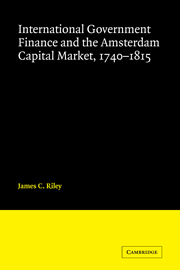Book contents
- Frontmatter
- Contents
- List of tables and charts
- Acknowledgments
- 1 Introduction
- 2 The Amsterdam capital market
- 3 Public credit in the Dutch Republic
- 4 Supply and demand patterns
- 5 International government finance
- 6 The debtor states: I
- 7 The debtor states: II
- 8 The collapse of solvency
- 9 Economic consequences of lending to foreign governments
- Abbreviations
- Notes
- List of sources and works cited
- Index
7 - The debtor states: II
Published online by Cambridge University Press: 04 August 2010
- Frontmatter
- Contents
- List of tables and charts
- Acknowledgments
- 1 Introduction
- 2 The Amsterdam capital market
- 3 Public credit in the Dutch Republic
- 4 Supply and demand patterns
- 5 International government finance
- 6 The debtor states: I
- 7 The debtor states: II
- 8 The collapse of solvency
- 9 Economic consequences of lending to foreign governments
- Abbreviations
- Notes
- List of sources and works cited
- Index
Summary
Russia
Revenue and expenditure figures are available only intermittently for the second half of the eighteenth century, but it is apparent that Russia confronted almost perennial deficits (Chart 7-1) during the reigns of Catherine II and Paul I. The response followed a pattern typical in central and western Europe, centering first on attempts to increase existing taxes, introduce new levies, and reorganize the administrative system of revenue management in order to reduce overhead and improve control. Catherine pursued reforms both in the administration of tax collection and the centralization of account keeping over the entire period stretching from the conclusion of the Seven Years' War to the end of her reign in 1796. Those efforts did enhance revenues and led to marked improvement in the information available to the central administration of the empire. Catherine also added allocations from her personal resources. Nonetheless revenue gains did not keep pace with expenditures even in peacetime, and after the Seven Years' War Russia turned to more flexible means of expanding income.
The first attempt to borrow abroad in this area, initiated by Empress Elizabeth during the Seven Years' War, failed. But during the First Russo-Turkish War (1768–74), and in a period of growing Russian involvement in the internal affairs of Poland, Catherine arranged the simultaneous issue of paper currency through the Assignat Bank formed in 1768 and the negotiation of foreign loans in Amsterdam and Genoa.
- Type
- Chapter
- Information
- Publisher: Cambridge University PressPrint publication year: 1980



